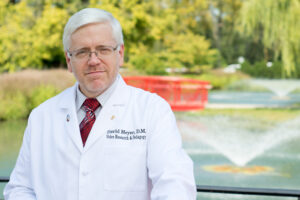David Meyer, Shenandoah University – COVID-19 and Singing
 Contracting COVID-19 may lead to many challenges.
Contracting COVID-19 may lead to many challenges.
David Meyer, associate professor of voice at Shenandoah University, explores those associated with surviving.
A leading scholar and researcher of the singing voice, Dr. David Meyer is an active performer, teacher, and voice scientist. He serves as associate professor of voice and voice pedagogy at Shenandoah Conservatory. He is also a member of the Scientific Advisory Board of the Voice Foundation and is co-chairman of the Voice Science Advisory Committee of the National Association of Teachers of Singing. In 2010 he received the Van L. Lawrence Fellowship, a prestigious national award in recognition of his contributions to the field of teaching singing and the use of voice science.
COVID-19 and Singing
COVID-19 discussions usually focus on three outcomes: avoiding infection; contracting it and recovering; and contracting it and dying. We examined another outcome: contracting COVID-19, surviving, and living with its after-effects. These can be devastating, especially for those who rely on their voice.
COVID-19 commonly spreads through airborne particles. These have two categories: droplets and aerosols. Droplets are large particles produced by coughing or sneezing. They carry a large viral load, but are less dangerous as they quickly fall to the ground. Medium-sized particles between 1 and 5 micrometers float in the air for hours, reach the lower airways with a high viral load, and carry a higher probability than droplets of causing infection. These medium-sized particles are produced in large quantities during speech and singing.
Lung disease following COVID-19 is a known after-effect, even in those with mild infections. Some lung lesions will gradually heal or disappear, but many will harden into scar tissue called pulmonary fibrosis that stiffens the lungs and causes shortness of breath. This reduction in the ability to breathe can be permanent and life-changing.
Chronic fatigue appears to be common after COVID-19, affecting over half of individuals. Other after-effects include intubation injury, vocal fold paralysis or paresis, and sensory neuropathies of the larynx. Many of these result in irreversible damage to the voice.
Eliminating voice-related transmission of COVID-19 is unlikely. Rehearsing online is the only truly safe option. In-person rehearsal risks are reduced when singers are outside, alone or in very small groups, (and it goes without saying) always wear face masks while speaking or singing around others.



The Journal of Voice article (and credits its multiple authors) may be viewed at these links:
https://www.sciencedirect.com/science/article/pii/S0892199720302812?via%3Dihub
or
https://linkinghub.elsevier.com/retrieve/pii/S0892199720302812